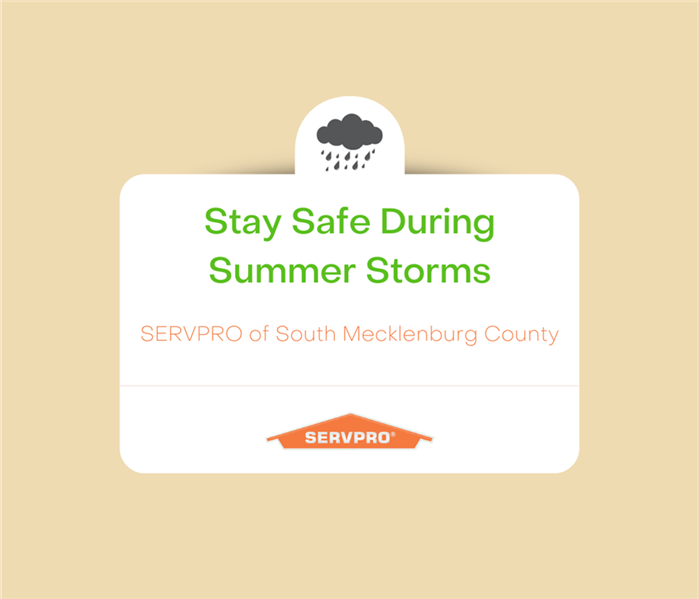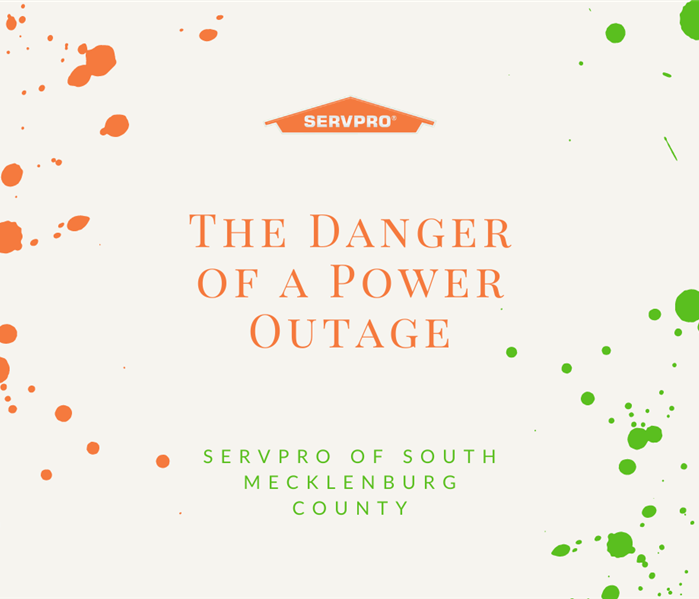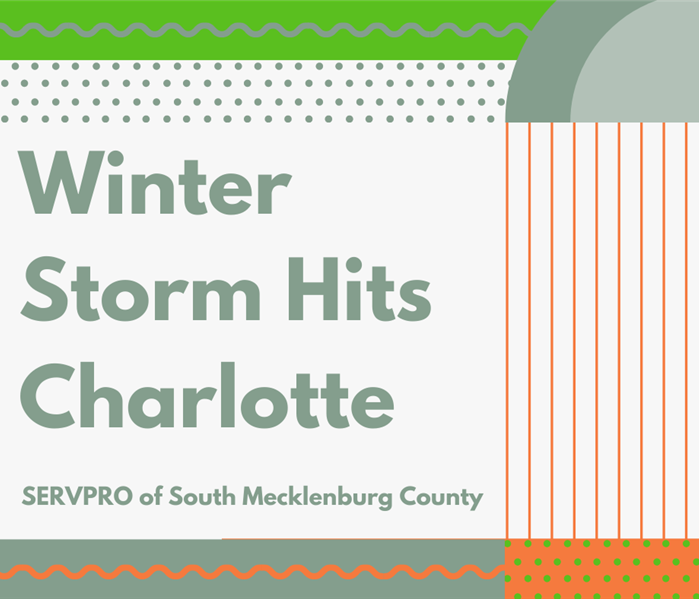Archived Storm Damage Blog Posts
It’s Hurricane Season – Take Steps to Prevent Water Damage | SERVPRO® of South Mecklenburg County
6/1/2023 (Permalink)
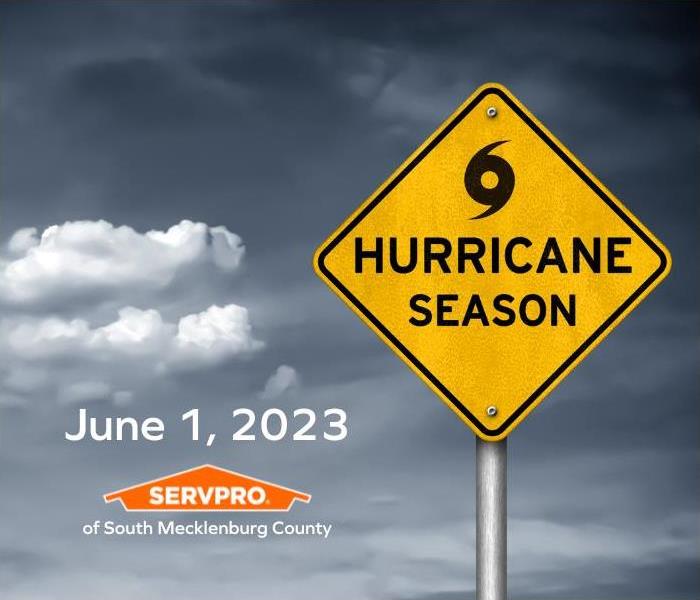 June 1 marks the first day of the 2023 Hurricane season
June 1 marks the first day of the 2023 Hurricane season
Hurricane rainfall presents an opportunity for water damage to your property. Leaks and floods can cause damage and require that you temporarily move out of your building while it’s restored. This presents a challenge as you want to get back to business as usual as soon as possible! Furthermore, severe leaks can lead to floods which can increase your risk of exposure to mold, chemical hazards, injuries, and more.
Fortunately, these inconveniences are preventable! Whether your water emergency occurs in an office building or big box store, it is imperative that you take measures to prevent leaks and damage to your property. Keep a look out for the following:
Damaged Windows
Water can seep through windows that aren’t properly sealed. This can cause mold build-up and damage to walls. Because caulk, the material that’s often used to seal windows, breaks down over time, be sure to have your windows resealed regularly.
Broken Pipes
Changes in pressure throughout the year and cold weather can cause pipes to break and burst. Although there are some tell-tell signs of this issue, such as water stains on walls or floors or an unpleasant and musty smell, detecting leaky pipes is challenging. With that said, it’s best to consult a professional to help determine whether your property has broken pipes.
HVAC Problems
Hurricane season often coincides with colder temperatures so we crank up the heat! However, ducts in the HVAC system can get worn out and damaged over time, especially during seasons like this, and cause leaks. For that reason, the system needs to be cleaned regularly and any water in it needs to be removed. Like broken pipes, it’s sometimes difficult to determine whether your HVAC system is causing a leak, so it’s best to consult a professional.
One of the best ways to get ahead is to create an Emergency Ready Profile. This is an immediate plan of action for how to restore your building after a disaster and get back to business. Additionally, we have 360 degree technology to document preloss conditions, including your equipment and where it was before disaster struck.
If you want to prepare your business for future disasters, contact us today and we will help you create an Emergency Ready Profile.
How Technology is Valuable During a Storm
3/30/2022 (Permalink)
 Using Technology During a Storm
Using Technology During a Storm
While the idea of technology seems simple on the outside, the constant updates and innovations can deter people from learning all that their devices can do for them. When emergencies or natural disasters hit close to home, it can be extremely advantageous to know how to make the best use of your technological devices. Technology allows you to stay updated on outside conditions as well as let family and friends know where you are.
We recommend keeping portable chargers readily accessible so that you can make the most of your technology during an emergency. Keep these tips on how to effectively use your devices in mind.
Applications for News Updates
Checking apps for updates on your smartphone is a fast and easy way to catch up with the latest news in Charlotte, NC. Make sure you have reliable news apps downloaded before inclement weather hits so that you can stay posted on local weather conditions and national updates.
Mark Yourself Safe
Another helpful feature of social media that not a lot of people know to use is the ability to mark yourself as safe. Facebook offers a feature called Safety Check that lets users mark themselves as safe if there is a dangerous situation in or near where you live. Simply updating your status as safe lets family and friends know that for the time being, you are out of harm’s way. The Red Cross has a similar feature called Safe & Well, which is both an app and website, where users can be marked safe.
Use Online Storage
Websites like Google Drive and DropBox ease the stress of possibly losing important copies of identification cards, passports, insurance policies, medical records, pet records, etc. in the event of a disaster. Be sure to scan and save any important documents before inclement weather is expected.
Make SERVPRO of South Mecklenburg County your go-to team when your Charlotte, NC, home or business is in need of any kind of remediation. Call us today at (704) 840–6112.
Want to know more about SERVPRO® of South Mecklenburg County? Please check out our other pages:
LinkedIn Facebook Instagram Twitter Angi BBB YouTube Pinterest Yelp
Four Types Of Hail Damage
1/18/2022 (Permalink)
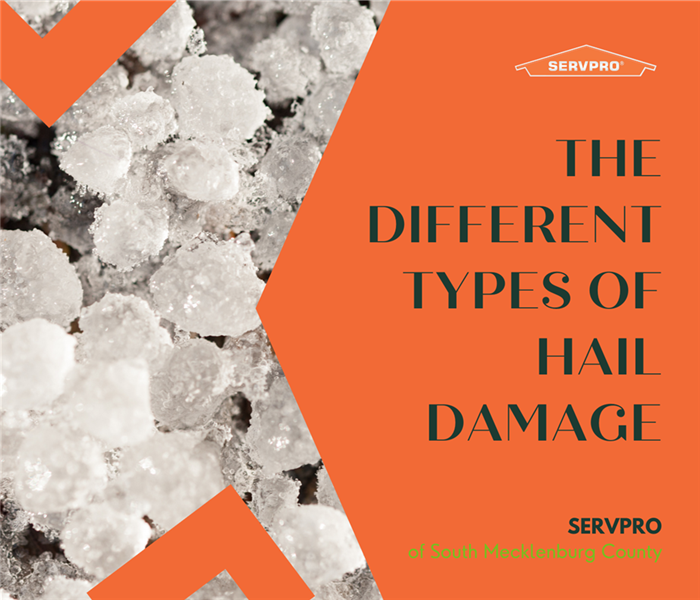 What to do after a hail storm.
What to do after a hail storm.
We all know hail can cause serious damage, but do you know what to do after a hail storm to get your property back into shape? Often we hear of roof damage after hail storms, and inspecting your roof in Charlotte, NC, after a hail storm is the best way to determine what damage may have occurred. Performing routine roof inspections can even help prevent damage in the next storm. Left unattended, a small, unnoticed opening could become a big problem during the next storm. After a hail storm, check for loose, missing, or damaged pieces of your roof. If you suspect any damage, call a roofing professional.
Roof Damage:
Make sure all roof covers, shingles, and drainage systems are intact. Check for hail damage on skylights, HVAC systems, and solar panels. Check for dings, missing pieces, and any hatches that may not be operating as expected. Keep in mind, skylights are prone to leaks, so regular checks could prevent water unwanted water from entering your home.
Cracked or Missing Shingles:
Shingles aren’t only for looks, they also protect your home from damage. Shingles act as our first line of defense against water entering your home or business. Missing or cracked shingles should be replaced immediately. Some shingles with a metal core are rated as hail resistant and can resist damage during hail storms, but even with these shingles, you should always inspect them after a hail storm.
Water Leaks:
Roof damage can lead to leaks in your building. If water gets past your shingles and underlayment, it can get inside your building. Water will follow the path of least resistance until it begins to pool or leak from your ceiling. Water leaks cause water damage that needs to be dried before mold or other problems have a chance to settle in. Inspect the ceiling for any discoloration, sagging, or peeling paint. If water has entered through the roof it might take some time to notice signs inside your home, the best defense is inspecting the roof before the damage sets in.
Attic Damage:
Hail damage may not always be obvious. Water can seep in and cause moisture problems where you can’t see it. Water could be making its way into your attic long before you see signs on your ceiling. Inspect the inside of your attic to make sure it is still dry. Moisture in the attic quickly becomes absorbed by insulation and wood, leaving you with the potential for a serious mold and mildew problem.
If you have experienced hail damage, call a professional roofing company out as soon as possible to repair the damage, and make sure to call SERVPRO of South Mecklenburg County if any water makes its way into your home. What might seem like a little water that can easily dry on its own, could require professional dehumidifiers and air movers, and delaying drying could cause more problems than it’s worth. So give us a call right away at (704) 840-6112, day or night.
Want to know more about us? Please check out our other pages:
LinkedIn Facebook Instagram Twitter Angie's List BBB Youtube Pinterest Yelp
Preparing For A Storm: Apartment Style
1/7/2022 (Permalink)
 Are apartment buildings safe during a storm?
Are apartment buildings safe during a storm?
There is a common misconception that large storms don’t have as much of an effect on big cities and that a building as large as an apartment complex is too big to have any real damage. While this might seem easy to believe there are actually a number of storms that hit Charlotte, NC, each year.
We have compiled a few tips on how to prepare for a storm from the safety of your apartment.
- Keep canned and pantry-safe food and drinks on hand.
- Have flashlights and extra batteries ready.
- Make sure you have a first aid kit with bandages, pain relievers, and other essentials that are up to date, don’t forget medications, as well as antibiotic ointments, can go out of date and become less effective.
- Keep in touch with loved ones, and have an emergency contact set.
- Pay attention to relatives with special needs, small children, and pets who might need extra care during an emergency.
- Find out what emergency plans your community has in place and what the notification system is for emergencies. Know if there is an emergency shelter, and take special care to ensure your pets will have somewhere to go in an emergency.
- Store all important documents such as insurance policies, medical records, bank account numbers, and social security cards in a fire and waterproof box. Consider making copies that are stored digitally in case you are unable to access the box.
- We also recommend having cash, a checkbook, and credit cards readily available. If there is a major power outage cash may be the only payment tender that stores will accept.
An apartment building is only as safe as its construction, so a strong storm can cause damage. It is important to have a plan to head to the safest room in your apartment. The safest room is an interior room on the lowest floor possible. We also recommend staying away from the windows as there is a risk of broken glass from severe winds.
Once the storm has passed check to ensure that water hasn’t entered through windows or doors, and keep a lookout for any water that could make its way through a damaged roof.
If your apartment building has sustained damage during a storm, SERVPRO of South Mecklenburg County is here to help. We can assess and remediate any storm damage the building may have sustained. Just give us a call at (704) 840-6112 day or night.
Want to know more about us? Please check out our other pages:
LinkedIn Facebook Instagram Twitter Angie's List BBB Youtube Pinterest Yelp
How Dangerous Is Lightning Really?
12/29/2021 (Permalink)
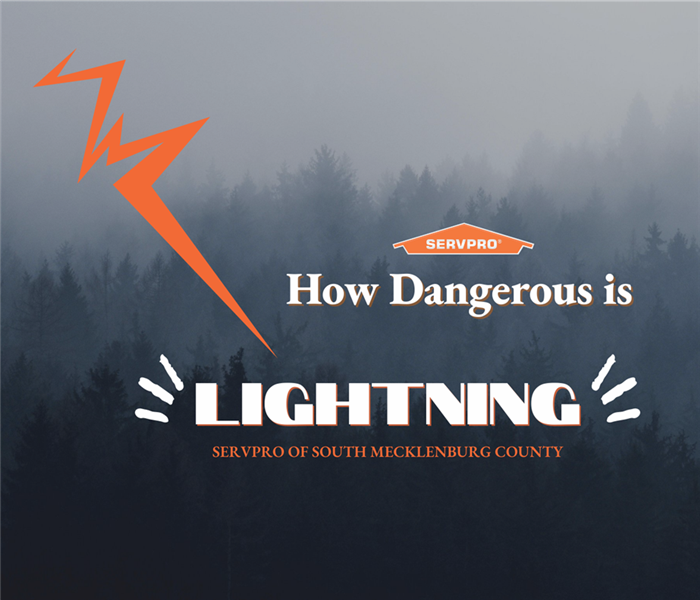 Can lightning damage my home?
Can lightning damage my home?
During a storm, there are many factors that have the potential to cause serious damage to your house. Besides wind, rain, and falling trees, a few other things can cause damage. One big one?
Lightning!
You may have heard the phrase lightning never strikes the same place twice. However this statement isn’t always true, it often strikes in the same place if there is a tall pointed object. The Empire State Building has been said to be struck an average of 23 times a year!
Some people also believe that lightning is only dangerous during cloudy or rainy conditions, the truth is, it can reach more than three miles outside of a storm. Lightning has even traveled as far as 15 miles before it strikes the ground. That means that even if the storm is a few miles away, it is smart to seek shelter and prepare for the coming storm.
Another type of lightning that can be confusing is “heat lightning,” something thought to only occur on hot summer days. The truth about “heat lightning” is that it is actually from storms that are too far away to be heard. Often mountains, trees, or the curve of the earth can prevent you from seeing the actual storm or lightning, and instead, only the flash of the lightning is visible. The reason heat lightning is thought not to have the same sound as normal lightning isn’t because there isn’t noise, but because the source of the lightning is usually too far to be heard.
Lightning is more than a loud noise during a storm, and a lightning strike to your Charlotte, NC, home, or business can cause fire and other serious damage. So what happens when lightning strikes your home?
Shock Waves: When lightning strikes your home, it can send a shock through the walls. Lightning can leave cracks in the walls, brick, stone, concrete, and in the fireplace. In some cases, there may even be cracks in your foundation after a lightning strike.
Power Surges: One of the most commonly talked about damages caused by lightning is power surges. When lightning strikes your home it sends a large amount of power through the wiring in your home, often blowing fuses and causing damage to electronics. That power surge could cause a fault somewhere and start a fire right away, or later.
Fire Damage: Not only can a fire start from wiring damaged during a surge, but it can also start from the lightning coming into contact with flammable objects. Your home is made from flammable objects like wood which can ignite when lightning travels through it.
So what does the damage to your home look like after a lightning strike? Your home could be completely fine with no damage at all, but not every situation is so lucky. Fires can start and spread in a matter of moments after the lightning strike. When the Charlotte Fire Department comes to help put out the fire you could be left with even more damage from the water.
If your home experiences lightning damage and is left with fire or water damage make sure to call SERVPRO of South Mecklenburg County.
Want to know more about us? Please check out our other pages:
LinkedIn Facebook Instagram Twitter Angie's List BBB Youtube Pinterest Yelp
Storm Safety in Charlotte, NC
11/9/2021 (Permalink)
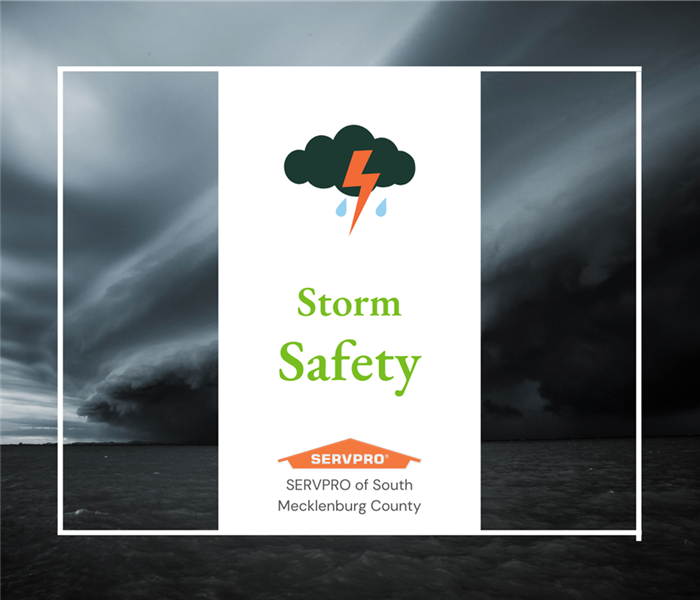 Flood Safety
Flood Safety
It feels like the weather changes almost instantly in Charlotte! One minute it is hot and dry, the next minute a storm or hurricane is approaching the area. No matter what, we seem to get our fair share of rain consistently!
We had a friend get in trouble really quickly while driving during a flood watch/warning. Thankfully, emergency crews rescued her in time but her car was a total loss. She literally said it was seconds from when she attempted to drive through what she thought was a "shallow but big puddle" and the time her car began to fill with water. After that, she reminds me every time it starts to rain like it is right now.
Thinking of my friends and neighbors in our Charlotte, NC, area, I decided to go on Weather.GOV today and do some research as I watched the rain pour down. I found these really good tips to keep us and our loved ones safe during this rainy time. Please stay safe out there!
During a flood, water levels and the rate the water is flowing can quickly change. Remain aware and monitor local radio and television outlets. Avoid floodwaters at all costs and evacuate immediately when water starts to rise. Don't wait until it's too late!
- Stay Informed: Listen to radio and television, including NOAA Weather Radio if possible, check the Internet and social media for information and updates.
- Get to Higher Ground: If you live in a flood-prone area or are camping in a low-lying area, get to higher ground immediately.
- Obey Evacuation Orders: If told to evacuate, do so immediately. Lock your home when you leave. If you have time, disconnect utilities and appliances.
- Practice Electrical Safety: Don't go into a basement, or any room, if water covers the electrical outlets or if cords are submerged. If you see sparks or hear buzzing, crackling, snapping, or popping noises--get out! Stay out of water that may have electricity in it!
- Avoid Flood Waters: Don't walk through floodwaters. It only takes 6 inches of moving water to knock you off your feet. If you are trapped by moving water, move to the highest possible point and call 911 if possible. Do NOT drive into flooded roadways or around a barricade; Turn Around, Don't Drown! Water may be deeper than it appears and can hide hazards such as sharp objects, washed-out road surfaces, electrical wires, chemicals, etc. A vehicle caught in swiftly moving water can be swept away in 12 inches of water can float a car or small SUV, 18 inches of water can carry away large vehicles.
As you can tell, water can be extremely dangerous and it can quickly cause large amounts of damage. If floodwater enters your home, be sure to follow flood safety tips from the CDC, and then give SERVPRO of South Mecklenburg County a call at (704) 840-6112.
Want to know more about us? Please check out our other pages:
LinkedIn Facebook Instagram Twitter Angie's List BBB Youtube Pinterest Yelp
Hurricane Season 2021!
10/14/2021 (Permalink)
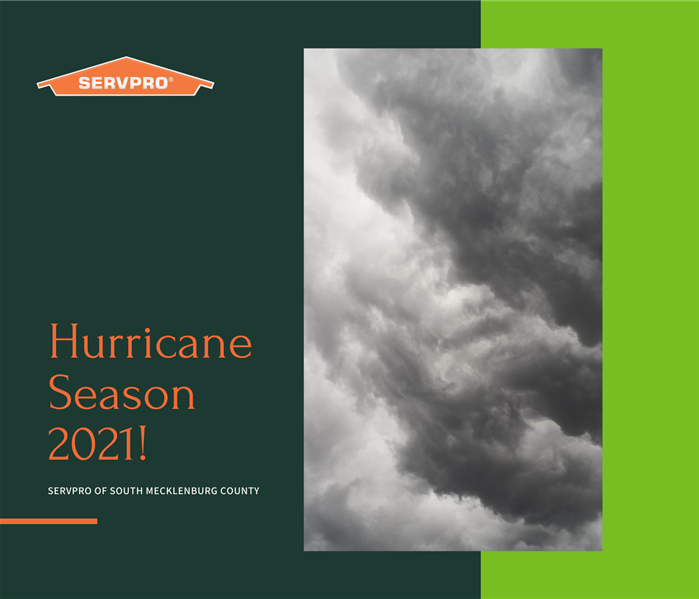 How long is hurricane season?
How long is hurricane season?
2021 has been a year that has required all of us to continue to be flexible, patient, careful, and intentional. Even though events like the COVID 19 pandemic have received most of our attention lately, we have been in hurricane season for a few months now. It has been an active season for North Carolina. To save you some time researching ways to prepare, SERVPRO of South Mecklenburg County wanted to share some tips with you. Thank you, Chubb.com and Ready.gov for helping us share these wonderful tips with our SERVPRO of South Mecklenburg County neighbors, friends, and family!
Hurricane Prep Tips
When a major storm is coming, stay informed by following NOAA Weather Radio or your local news channels for updates. In addition, make sure to obey all orders if requested to evacuate by the authorities. Follow these 10 hurricane and storm preparation steps to keep your home and loved ones safe before disaster strikes.
- Make a plan
If evacuation is necessary, turn off all utilities and follow community disaster preparedness plans. Select a common meeting place or single point-of-contact for all family members. If you have pets, have a plan for their evacuation as well. - Secure the exterior
Trim large trees and shrubs and bring all outside patio furniture, potted plants, bikes, and toys indoors. If necessary, secure outdoor sculptures and larger furniture with burlap or blankets tied with rope to prevent damage. - Install storm shutters
Protect windows, doors, and skylights with appropriate shutters or impact-resistant glass. You can nail pieces of plywood to window frames as last-minute protection. - Check wall hangings and art
Make sure wall hangings are secure and take notes about your art collection and any existing damage. Make sure that art hung on outside walls is taken inside, and elevated off the floor. - Move your cars
Move cars to higher ground or park them in your garage against the garage doors. Do not park under trees, power lines, or in low-lying areas.
- Power up
Fill your car’s gas tank, charge your cell phone, test your generator and have plenty of fuel ready in case of power outages. - Unplug appliances
Move appliances and household fixtures away from exterior doors and window openings. Store them in cabinets or interior closets, and ensure they are unplugged to prevent power surge damage. - Store important documents
Keep important documents, such as legal papers, birth certificates, marriage license, financial papers, and insurance policy information, as well as valuables such as jewelry, in a safety deposit box or in a bolted safe in an interior closet in your home. Using a fire and water-resistant container is one of the best ways to prevent damage to these important documents. - Prep an emergency kit
Gather flashlights, a portable radio, extra batteries, non-perishable food, bottled water, cash, blankets, clothing, and toiletries. - Identify a shelter room
This enclosed area should be on the first floor, in the central part of the house with no windows. Avoid all unprotected windows and doors until the storm passes.
These helpful tips came from Chubb.com Want more tips? Go to Ready.gov and find more on our blog.
Want to know more about us? Please check out our other pages:
LinkedIn Facebook Instagram Twitter Angie's List BBB Youtube Pinterest
Wind Damage Prevention
10/4/2021 (Permalink)
 Storm Wind Damage Prevention
Storm Wind Damage Prevention
We have all heard of a blustery fall day- but that beautiful fall afternoon can bring wind that is potentially damaging and dangerous. High winds can blow objects (including you!) around, and these objects pose a serious threat to you and your property. There are steps you can take to prevent damage and SERVPRO of South Mecklenburg County is here to help!
Before there is a weather event, you should:
- Clean up your yard
- Assess your trees and address dangerous trees and branches
- Have your roof inspected and repaired- high winds can lead to roof damage and water damage
- Check and reinforce weather stripping around windows, doors, garage doors
- Update your emergency supply kit
- Secure important documents in a weatherproof box and create backups in the cloud to protect against water damage
If there is a weather event, you will need to know the difference between a High Wind Watch, High Wind Warning, and a High Wind Advisory.
A High Wind Watch means that it’s possible for damaging or life-threatening winds to occur.
A High Wind Warning is issued when damaging or life-threatening winds are occurring or will occur soon.
A High Wind Advisory is issued when winds are strong enough to cause difficulty for those outside, but likely won’t cause widespread damage.
Once you understand the conditions, you can:
- Monitor the weather using radio, tv, and apps
- Use technology to your advantage
- Secure large and small items
- Secure doors and windows
- Find shelter in secure buildings
- Don't drive and stay put in a safe place until the event has passed.
- IF you must drive:
- Slow down!
- Pay attention.
- Do not drive near trucks, buses, and trailers.
- Watch for debris and fallen power lines and branches.
Once the storm or wind event has passed, call SERVPRO of South Mecklenburg County at (704) 840-6112 if you need us to come and clean up the mess. We will make it "Like it never even happened."
For more weather safety information, head to Weather.gov.
Want to know more about us? Please check out our other pages:
LinkedIn Facebook Instagram Twitter Angie's List BBB Youtube Pinterest
State Of The Art Equipment For Storm Damage
9/29/2021 (Permalink)
SERVPRO of South Mecklenburg County is proud to share that we offer state-of-the-art equipment to make your storm damage "Like it never even happened," after you have had a water loss. So what equipment do we use?
One of our favorite state-of-the-art pieces of equipment is the Injectidry system. Our Injectidry system dries walls, ceilings, and hard-to-reach areas (like crevices and cavities) by injecting air and/or removing moist air with negative pressure.
Many people believe that replacement is the only option when materials in their homes are affected by water damage. Replacement is not always the only option! With the Injectidry system, we are able to save more of your home than ever before. With a water restoration specialist, you can expect a team that cares about you and your belongings. We will help save your home and your personal possessions if possible.
SERVPRO of South Mecklenburg County will respond quickly to your storm-related loss before further damage can occur- like floor buckling and mold and mildew growth. We use only the latest and most proven industry techniques, highly qualified technicians, and cutting-edge technology and equipment to ensure that we not only professionally and efficiently address your loss- we do so in the most cost-effective way possible! As a result, we have saved many homeowners thousands of dollars in replacement costs.
What does this mean for you? It means that we are here 24/7 and that SERVPRO of South Mecklenburg County is committed to only providing the BEST for your loss!
Want to know more about us? Please check out our other pages:
LinkedIn Facebook Instagram Twitter Angie's List BBB Youtube Pinterest
National Dog Day - How To Keep Your Pet Safe During a Storm
8/26/2021 (Permalink)
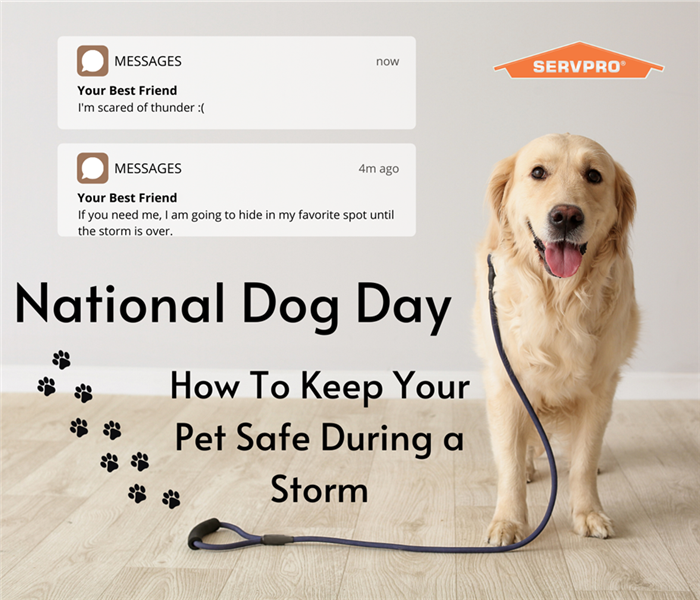 Storm Safety For Pets
Storm Safety For Pets
Happy National Dog Day to you and the furry friends in your life! Today is another opportunity for us to recognize and appreciate the positive contributions that dogs bring in our lives.
While their love and companionship never gets old, they also help us out in many ways: watchdogs for our safety, lead the blind, and aid in search and rescue.
Like us, dogs have strong emotions. One of them is anxiety, especially during the storms that Charlotte, NC can face in the summer. There are many ways that you, as a dog owner, can ease the feelings that arise as a storm approaches.
If you know a storm is heading your way, immediately bring your pets inside. Animals can become disoriented and overwhelmed when they sense a change in weather conditions, so they may try to wander away in this situation. If your dog is prescribed any anxiety medication, now is an appropriate time to give it to him or her.
In addition to wearing an ID tag, they should be microchipped in case they get away. It makes it much easier to identify them, and they can be quickly returned to you.
Dogs may find themselves shaken up when they hear thunder or feel the house shake from thunder or winds. If you have to leave home, bring your pet with you. Create a list of nearby places that are pet-friendly, or see if you can drop your pet off at a friend’s or family member’s home. When picking your pet up, you might find them hiding in unusual places like under beds, in closets, or even in the bathtub, start by looking in their favorite hiding spaces to avoid searching aimlessly..
If you are staying home, keep pets away from windows as much as possible to prevent them from trying to jump out or in the case something causes your window to shatter. Never put pets in crates during a storm as they may end up trapped if there is a situation in which they need to escape.
We hope that heavy rains don’t come inside your home, but if they do, move yourself and your pet to the highest location in your home. Your dog can take shelter even in cabinets or shelving.
Lastly, consider creating an emergency pet plan and putting together a first-aid kit catered to your pet’s needs in an emergency. ASPCA has a list of items that should be in the kit.
For other tips on fire and water cleanup & restoration, SERVPRO of South Mecklenburg County is here to assist you. Call us, day or night, at (704) 840-6112.
Want to know more about us? Please check out our other pages:
LinkedIn Facebook Instagram Twitter Angie's List BBB Youtube Pinterest
What To Do if Your Business is Affected by a Flood
7/15/2021 (Permalink)
 What to do After a Flood in Your Business
What to do After a Flood in Your Business
When it comes to your business, you want to do everything you can to ensure it succeeds. The last thing you want to experience is having something negatively impact what you have worked so hard towards. Unfortunately, this can often be unpreventable, making it extremely important to know what to do in the case of an unexpected setback. Here at SERVPRO of South Mecklenburg County, we want to teach you how to handle one type of disaster, floods.
Causes of Floods
When a business experiences severe flooding, it is the result of either man-made or natural flooding. Man-made flooding can be caused in a number of different ways including overflowing the sink, a leaking water heater. Sometimes these can be the result of user error and other times they can be caused by overuse or wear and tear. Natural flooding is caused by an environmental factor such as excessive rain resulting in a temporary layer of water on the ground that causes damage to your business. Regardless of the type of flooding, it is important to know how to handle it in case it happens to your business.
What to Do in the Event of Flooding
If your business experiences severe flooding the most important thing to do is keep the employees and customers safe. It is essential to have an evacuation plan in the event that a flood occurs. Once everyone is accounted for and it is deemed safe to reenter the building, turn off the gas, appliances, and power within the building. This is essential as it can prevent further damage from occurring to your business.
What to Do With Flooded Contents
When your business floods, important documents, and equipment can be damaged by water, but our technicians are experienced in water damage remediation. Every item affected by the flood will be cataloged and either salvaged, stored, or disposed of by our team. For any items that need to be replaced, we help deal with your insurance adjuster, to help replace the item without any headaches.
What to Do Next
If your business has flooded, removing the water and beginning the restoration process quickly is essential to returning your business to its natural form. In the unfortunate case that your business is affected by any kind of flooding, SERVPRO of South Mecklenburg County will be there to effectively take care of any damages caused. We can be reached at (704)-840-6112 and will be ready any time day or night to help you in your time of need.
Want to know more about us? Please check out our other pages:
LinkedIn Facebook Instagram Twitter Angie's List BBB Youtube Pinterest
Thunderstorms: How to Prepare
7/12/2021 (Permalink)
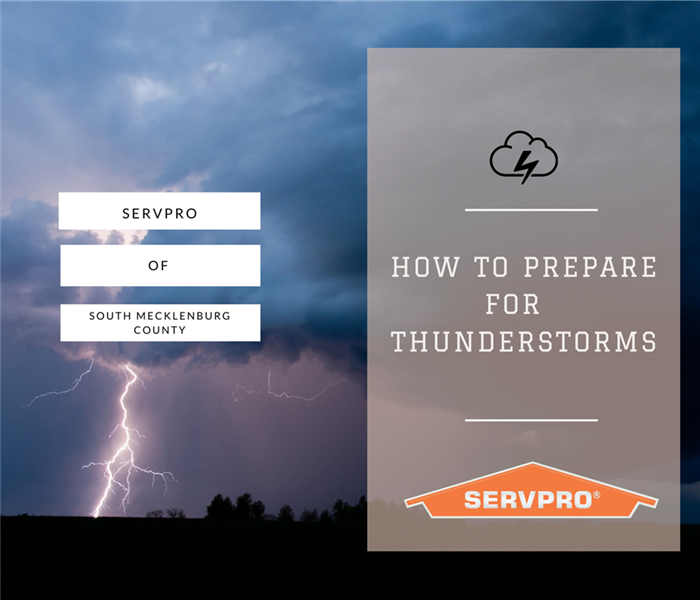 How to prepare for thunderstorms
How to prepare for thunderstorms
Summer heat is definitely here and that means thunderstorms are too. Thunderstorms especially in summer can pop up unexpectedly and it is important to be prepared. Thunderstorms can be very dangerous and cause significant damage
A thunderstorm is created by surface heating. In a thunderstorm, there is upward atmospheric motion that transports whatever is in the air along with it. A thunderstorm is a result of this convection. They are most common in the spring and the summer months during the afternoon and evening hours of the day.
Many hazardous weather events are associated with thunderstorms. Lightning can be very dangerous and when it strikes it can cause fires. Hail during thunderstorms can also be a hazard. Hail forms when drops of water freeze together in the cold upper atmosphere. Large hail can severely damage cars and homes. Strong winds can also knock down power lines and cause damage. Thunderstorms are also often associated with flooding, which can cause damage to your yard and the exterior of your home as well as inside your home.
It is important to be prepared for these intense weather events, and fortunately, there are steps that you can take to stay safe during summer thunderstorms.
If You’re Indoors
If you are already safe inside of the house, avoid using corded items such as computers or power tools, as lightning can travel along electric currents and damage electronics. High winds and hail have the potential to shatter glass, so be sure to stay away from windows and glass doors in your home during a severe thunderstorm.
If You’re Outdoors
If you are outside and see dark clouds or hear lightning, take shelter immediately. Head for enclosed buildings if possible rather than garages or pavilions. If there is nowhere inside to go, get inside of a vehicle and get off of motorcycles and bikes. If no shelter at all is available, squat low to the ground and find the lowest possible place to take shelter in such as a ditch or roadside. If you are in water, head to shore immediately, as water can carry electrical current.
How to Protect Your Home and Belongings Before The Storm
Remove dead or overhanging tree branches that could fall on your house if the tree is struck by lightning. Put your entire house on a surge-protection system to avoid having your electronics damaged during a storm surge. Any furniture or toys should be brought indoors or tied down to prevent wind from blowing objects around.
If your home has been damaged by a recent summer thunderstorm, SERVPRO in South Mecklenburg County can help. For more information about our services, contact us at (704) 840-6112.
Want to know more about us? Please check out our other pages:
LinkedIn Facebook Instagram Twitter Angie's List BBB Youtube Pinterest
Charlotte in Hurricane Elsa’s Path
7/7/2021 (Permalink)
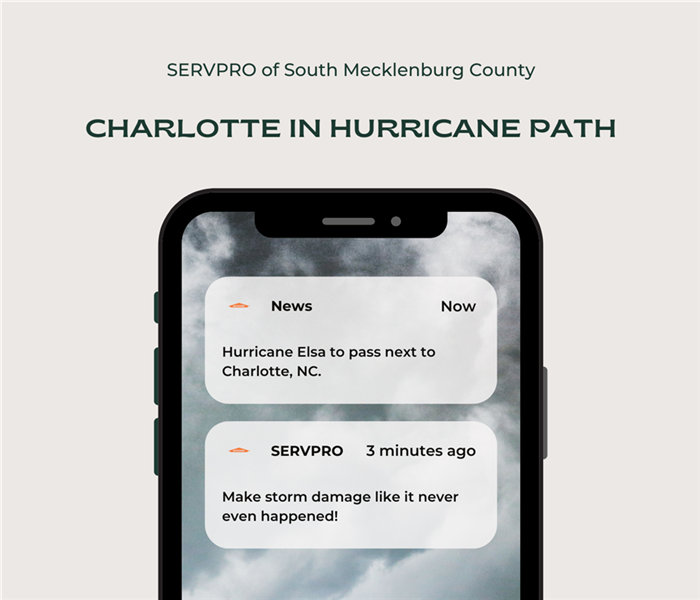 Will Hurricane Elsa Hit Charlotte?
Will Hurricane Elsa Hit Charlotte?
As hurricane Elsa moves out of the gulf and onto land, the path is predicted to include Charlotte, NC. Before the storm gets closer to Charlotte, NC, make sure you and your family are prepared for what could come. Keep reading to learn the strength of Elsa, where the storm is headed, and how you can prevent the possible damage Elsa may bring.
The Strength of The Storm
With sustained winds of 63 mph as of Wednesday at 9:20 AM, residents of the Pineville, NC, area can expect to experience some wind in the coming days, however, the storm will likely be much less severe once it reaches North Carolina. While the storm is a category 1 hurricane while it hovers over the gulf, it is expected to lose strength and be classified as a tropical depression.
Where Will The Storm Hit?
Elsa is expected to pass to the right of Matthews, NC. Because Charlotte, NC, will not be in the direct path of Elsa, less than 1 inch of rain is expected in the area. For more information on Elsa as the storm continues to get closer be sure to stay up-to-date with the Charlotte Observer.
Will The Storm Cause Damage?
There is no way to know what the damage from a storm will be, but it is always smart to be prepared. Make sure you and your family stay safe during the storm, and remember, your home may need to be prepped for the storm as well.
Keep Your Home Safe
Even though living in Charlotte, NC, means we don’t often think of storm-proofing when a hurricane is coming our way, there are still a few easy steps you should take. Preparing for a storm can help prevent severe damage to your home. Before Elsa gets closer, head outside and make sure that any toys and other objects are brought inside. Heavier items like furniture should be secured to the ground to prevent things from being blown around in the wind and breaking windows.
What if Elsa Damages My Home?
If your preparations were no match for the storm, SERVPRO of South Mecklenburg County is here to help. Our technicians are experts at storm restoration, so you can feel comfortable knowing your home will be back to pre-storm conditions in no time. As soon as you notice damage to your home, give us a call at (704) 840-6112 so we can make it "Like it never even happened."
Want to know more about us? Please check out our other pages:
LinkedIn Facebook Instagram Twitter Angie's List BBB
Tropical Depression Danny To Move Inland, Missing Charlotte
6/29/2021 (Permalink)
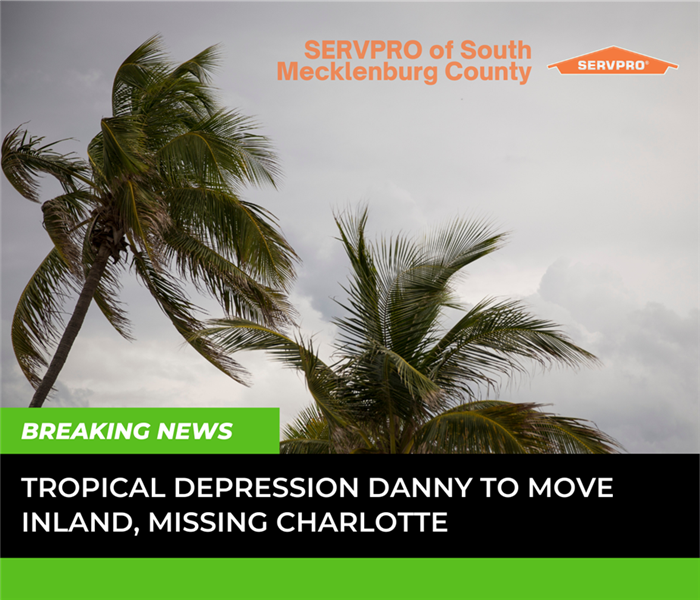 Will Tropical Storm Danny Hit Charlotte?
Will Tropical Storm Danny Hit Charlotte?
Danny, a Tropical Storm off the coast of South Carolina has now weakened to a Tropical Depression. The storm developed close to the coast, giving it little time to develop. As the storm made landfall Monday evening with wind speeds as high as 40 mph, speeds quickly dropped, lowering the classification to a depression.
Even though the storm classification has been lowered, it will still bring a few inches of rain as it travels inland at 15 mph.
The current path of the storm brings it North West towards Atlanta, GA, before it dissipates. Even though the storm won’t make it to Charlotte, NC, expect to see scattered storms throughout the week.
While Danny likely won’t bring much wind or rain, it is always best to prepare for future storms. Danny is only the fourth named storm of the year, out of an expected 13 to 20 for the 2021 hurricane season. Make sure to prepare your home and yourself for the dangers and damage that can come with summer storms. When prepping for storms be sure to update your emergency ready kit to include all family members and their needs. Even pets should have their own emergency plan.
For more information on hurricane season in Charlotte,NC, look at the North Carolina Department of Public Safety’s Hurricane Guide. You can also find more information in our previous hurricane posts.
Want to know more about us? Please check out our other pages:
LinkedIn Facebook Instagram Twitter Angie's List BBB Youtube Pinterest
Flood Safety Tips For People With Disabilities
6/25/2021 (Permalink)
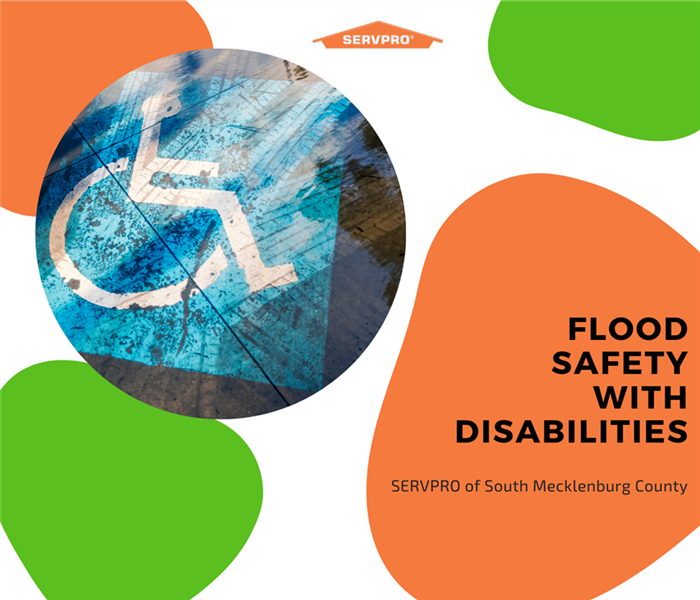 How to prepare for flooding with a disability
How to prepare for flooding with a disability
If you have a disability you may have planned for fire or other emergencies, but have you created a plan for flooding? If you, a family member, or neighbor have disabilities, creating a flood emergency plan is essential to keeping everyone safe.
This list is a great way to start your flood safety plan:
- Establish a personal support network. This can be family, neighbors, or other nearby people who can help get you to a safe place during a flood. Provide them with copies of your emergency plan and include all necessary medical information.
- Make a list of medication dosages, necessary medical equipment, and emergency contacts and post it in an easily visible location.
- Register with local emergency management, the fire department, and volunteer centers.
- Identify multiple evacuation routes from your home and work.
- Always carry emergency health information and emergency contacts. Using a medical alert tag can help alert those around you if you are unable to.
- If necessary, have an alternate form of communication like a whiteboard or notebook and pen.
- If you are mobility impaired and live or work in a highrise building, ensure that there is a mobility chair installed in the stairwell.
- Create an emergency ready kit and include items like wheelchair batteries, oxygen, medication, food for guide dogs, or any other medical necessities.
- Keep a flashlight, whistle, or bell nearby to signal to others if you are in need of assistance.
When flooding occurs in your home it can feel overwhelming, but the most important thing is to stay safe. SERVPRO of South Mecklenburg County is here to worry about the rest. If you have experienced a flood in your Charlotte, NC, home, give us a call anytime at (704) 840-6112.
Want to know more about us? Please check out our other pages:
LinkedIn Facebook Instagram Twitter Angie's List BBB
How to Storm Proof Your Garage
6/16/2021 (Permalink)
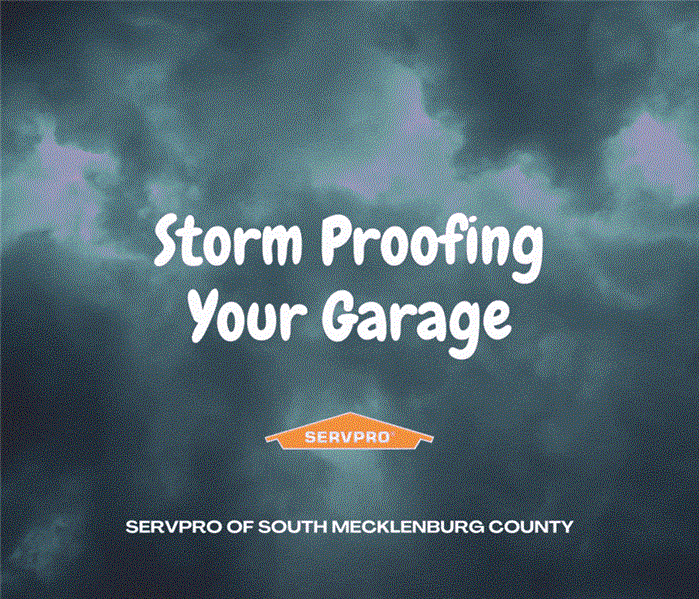 How to storm proof your garage
How to storm proof your garage
When a summer storm is heading towards Charlotte,NC, you should always check to make sure your home is ready for possible high winds, strong rain, lightning, and even hail. When you begin to storm-proof your home, be sure not to overlook the garage.
Just one inch of floodwater can cause severe damage to your home, and a garage that is not storm-proofed can easily let in an inch of water or more. So what can you do to protect your garage from the effects of a storm?
Replace Your Door
Even though Pineville, NC, doesn’t often experience high winds, speeds of 121 mph have been recorded as close as Grandfather Mountain, we still experience high winds during hurricane season. Upgrading your garage door to one that is rated for higher winds can help protect it from being bent and dented during high winds which can impact the seal and let water into your garage.
Upgrade Your Door
If you aren’t looking to get a new garage door, you can retrofit your current one with storm-resistant upgrades. Retrofitting kits commonly include telescoping lightweight braces that sit vertically above the door and through floor mounts. The braces will also attach to the hinges of the door itself. Once you install the foundations of the kit, the braces can be put up in about 5 minutes, so you can easily prepare your garage doors before a storm.
Check Your Windows
If there are windows in your garage, this can be a weak point. Check that all windows are in good condition and add weatherstripping where necessary. If your windows are not strong enough to withstand the pressures of a storm, consider putting up storm boards until the windows can be replaced.
Install Drainage
As one of the more vulnerable places in your home, sometimes water entering the area is inevitable. If water commonly pools outside of your garage door, consider adding a trench drain to keep water from putting pressure on your garage door. If your garage door is not able to keep water out of your garage, installing a drain inside the garage is a good way to prevent water levels from rising high enough to enter your home.
Purchase Flood Vents
If your home is located in a flood plain or area that commonly sees quick-moving floodwater, adding a flood vent could save you thousands in garage door damages and foundation problems. When floodwater pushes against a garage door it has the ability to break and bend the door, allowing all of that water to enter your garage and possibly your home. When you add a flood vent to your garage door, it will open to allow water to flow freely between both sides of your garage door. By allowing the water to flow freely you are preventing large amounts of water from quickly flowing into your garage and causing damage.
If these tips don’t protect your Matthews, NC, home from flooding, SERVPRO of South Mecklenburg County is here to help. Our team is “Faster to Any Size Disaster” so your home will be restored in no time.
Want to know more about us? Please check out our other pages:
LinkedIn Facebook Instagram Twitter Angie's List BBB
Tornado Watch VS. Tornado Warning: Know The Difference
5/30/2021 (Permalink)
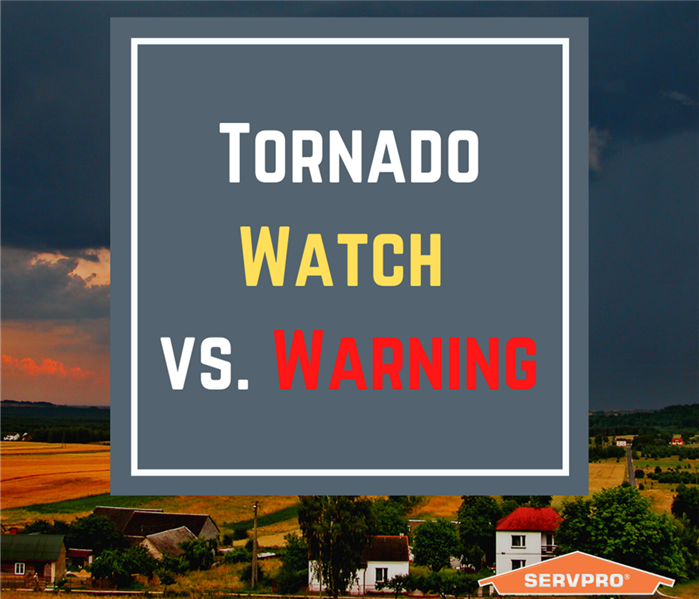 Storm watch vs. warning: protect yourself from storm damage
Storm watch vs. warning: protect yourself from storm damage
Weather can change in an instant in Charlotte,NC , and you must be prepared when storms arise. Tornadoes can occur frequently in North Carolina. A tornado is a violently rotating column of air extending from the base of a thunderstorm down to the ground. Tornadoes can be deadly. They are capable of completely destroying structures, uprooting trees and hurling objects as large as cars and houses through the air. Tornadoes can occur any time of year, but they are most common during tornado season, which is March through June. Tornadoes are most common in the central plains and the southeastern United States but have been reported in all 50 US states, including North Carolina. In fact, we have seen tornadoes as recently as a few weeks ago!
If you know what to do before, during, and after a tornado, you can minimize your risk of injury. Being prepared begins with knowing when to properly take precautions during stormy weather. Stormy weather can quickly escalate from a tornado watch to a tornado warning.
Tornado Watch
A tornado watch means be prepared! Tornado watches are issued by county storm prediction sites, as they monitor severe weather. These sites will tell you whether tornadoes are possible in your area. If your area is in a tornado watch, first of all, remain calm. Take action by reviewing and discussing your emergency plans. Additionally, check on your supplies and make sure they are up to date, and make sure your safe room is ready if a tornado comes your way. Once a tornado watch has been issued, it can quickly turn to a tornado warning, so be ready to act quickly if a warning is issued or you suspect a tornado is approaching. Being prepared before a watch turns to a warning can help save lives.
Tornado Warning
A tornado warning means it is time to take action. A tornado has been sighted or indicated by weather radars. Your life could be in danger in tornado warning situations. Tornado warnings encompass a small area such as a small county, so if a warning has been issued in your area that means a tornado is likely very close. Take action and move to an interior room on the first floor of a building, avoiding windows. If you find yourself outdoors or in an unsteady building such as a mobile home, move to the closest substantial shelter and protect and cover yourself from flying debris.
Knowing the difference between a tornado watch and a tornado warning can save lives. If you experience damage after a tornado or any type of storm, give SERVPRO of South Mecklenburg County a call at (704) 840-6112.
Want to know more about us? Please check out our other pages:
LinkedIn Facebook Instagram Twitter BBB Pinterest
2021 Hurricane Season Is Approaching
5/28/2021 (Permalink)
 hurricane season storm damage
hurricane season storm damage
A hurricane is a rotating, low-pressure weather system that forms over tropical waters. When a storm’s maximum sustained winds speed reaches above 74 miles per hour, it is called a hurricane.
The Atlantic hurricane season, which affects Charlotte,NC, normally begins on June 1st and goes until November 31st. It is important to be aware of and be prepared for hurricane season. Hurricanes can be extremely dangerous due to high winds and flooding, and can sometimes be fatal.
According to NOAA’s Climate Prediction Center as of May 20th, there is another above-normal Atlantic hurricane season predicted for 2021.
How Many Storms Will There Be?
In 2021, there will be around 13 to 20 named storms, where wind speeds are expected to be 39 miles per hour or higher. Of these, 6 to 10 could become hurricanes with winds of 74 mph or higher. 3 to 5 major hurricanes (category 3, 4 or 5; with winds of 111 mph or higher) are also predicted to occur. NOAA provides these ranges with a 70% confidence.
The National Institute of Atmospheric and Oceanic Sciences has urged residents of coastal regions to be prepared for a hurricane season full of unprecedented flooding and intense storms, much like the 2020 season presented.
How Do I Prepare?
Hurricanes can be dangerous and damage your home and property. You can prepare for these storms by always having emergency supplies readily available. Emergency supplies include everything you need in case of a storm, including water, a flashlight, a blanket, and enough food for you and your family to last until help arrives or the storm passes.
Additionally, create a plan for disasters with the people that live in your household. In this plan, include where you will meet friends and family should a storm separate you, how you plan to evacuate if needed, and how you will secure your home and belongings in the event of an evacuation.
Finally, evacuate as soon as possible to stay safe from the storm. If there is time, secure windows and doors on your home by affixing wood or metal to your windows to prevent glass from breaking in high winds.
If you have experienced home or property damage due to a hurricane or tropical storm, SERVPRO of South Mecklenburg County can help, simply call us at (704) 840-6112.
Want to know more about us? Please check out our other pages:
LinkedIn Facebook Instagram Twitter BBB Pinterest
Stay Safe During Summer Storms
5/21/2021 (Permalink)
While we most often think of spring as the time of year with the most rain, summer storms can be severe as well. In fact, hurricane season is quickly approaching. North Carolina’s hurricane season runs from June 1 to November 30.
While storms can be unpredictable, there are still steps you can take to stay safe during all summer storms. If you need to prepare your business for summer storms or other emergencies, SERVPRO of South Mecklenburg County can help create an Emergency Ready Plan. Contact SERVPRO of South Mecklenburg County to learn how we can help prepare your business for emergencies. Prepare for storms with these tips:
Before The Storm:
- Put together an emergency supply kit
- Unplug any electronics
- Secure any objects outdoors
- Shutter windows and secure doors
During The Storm:
- Seek shelters indoors
- Use a battery operated radio to stay up to date
- Stay away from windows and doors
After The Storm:
- Never drive through flooded areas
- Stay away from downed power lines
- Stay away from areas that have sustained storm damage
For more information on hurricane season in Charlotte,NC, look at the North Carolina Department of Public Safety’s Hurricane Guide. You can also find more information in our previous hurricane posts.
Want to know more about us? Please check out our other pages:
LinkedIn Facebook Instagram Twitter BBB Pinterest
The Danger of Power Outages
3/5/2021 (Permalink)
Power outages are a major annoyance, with no internet and no TV, but what about your home? When the power goes out there are some critical appliances in your home that will stop working.
Sump Pump: these pumps, generally located in basements, prevent water from entering the ground. Without power no water is being removed, potentially allowing water into your home.
Heating Units: Both gas and electric units rely on electricity to keep your home warm, and without heat, your home can get cold fast. If the temperature is below freezing turn faucets on to drip to prevent freezing and bursting pipes.
Freezer: Ice can build up in a freezer, and when it begins to melt, that water puddles. The best way to manage ice melt is to put a cookie sheet below the door to catch any drips. If you try to open the freezer to remove the ice, cold air escapes speeding up the process.
The best way to prevent any issues during a power outage is to purchase a generator. If you do choose to install a generator, or you already have one, be sure to follow generator safety.
If you experience storm damage, call in the experts at SERVPRO of South Mecklenburg County
Get Social With Us: LinkedIn Facebook Instagram Twitter Angie's List BBB
Winter Storm Hits Charlotte
2/18/2021 (Permalink)
With low temperatures, rain, sleet and ice it is important to be prepared. Here is what you should know about the storm.
- Winter storm warnings and winter weather advisories are in effect as freezing rain and sleet hit north of I-85.
- Freezing rain and sleet could cause ice on roads and other surfaces. Trees and power lines can be damaged and fall from low temperatures and ice.
- In addition to freezing rain heavy rainstorms may cause flash flooding.
With this dangerous weather be sure to follow our tips on protecting pipes from freezing temperature. It is also important to prepare your property for winter weather, read our blog post to protect your home.
As this weather continues in the Charlotte, NC, area be sure to call SERVPRO of South Mecklenburg County if your home or business has a water or fire disaster.
Get social with us:
LinkedIn Facebook Instagram Twitter Angie's List BBB






 24/7 Emergency Service
24/7 Emergency Service

















